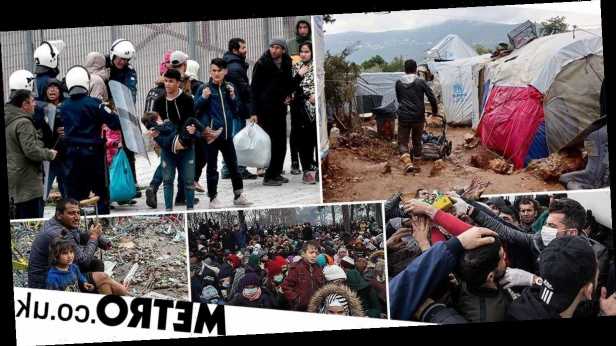The violent treatment of refugees crossing to the Greek islands could worsen if coronavirus spreads into insanitary and overcrowded camps, a humanitarian worker has warned.
More than 10,000 refugees, including children, have been met with tear gas, water cannons and reportedly live ammunition at the Greek border, after Turkey lifted restrictions on migrants heading to Europe last week. Refugees were captured huddled together in the cold having been forced to strip down to their underwear, after reportedly trying to wade across the Evros River, in north-western Turkey yesterday.
Volunteers warn the migration crisis has now reached ‘breaking point’ and if Covid-19 spreads to the camps, ‘it would be a disaster of unimaginable proportions’.
Help Refugees volunteer Hannah Green, 28, told Metro.co.uk: ‘It would spread like wildfire.
‘Many are sleeping outside. They already have s*** immune systems and are living in s*** conditions, with appalling health facilities’.
‘Most people on the island of Samos don’t even live near water points,’ she added. ‘Help Refugees has been handing out hand sanitiser but it’s impossible to provide enough for more than 7,000 people.’
On the island of Samos, 7,400 people are currently staying in a camp built for just 648, with 30 per cent of those being children.
Over the past week, tens of thousands of mainly Afghan and Syrian refugees have massed at the border and headed to the Aegean Islands in makeshift rafts. Turkish officials accused Greek forces of killing a migrant and wounding five others, as they tried to cross the 125-mile border on Wednesday. Greece rejected the claim as ‘utterly fake news’.
‘For the Greek government, if coronavirus comes into the picture, it would justify having an even more aggressive and violent response to people trying to cross the border,’ said Hannah who has been living on Samos for six months.
Hannah insisted: ‘This is a European problem, not a Greek problem. We all need to manage this and refugees need to be transported to other countries’.
‘Vulnerable children who have fled from war are now having their childhood taken from them on the shores of Europe,’ she added.
The volunteer said the islands have turned into ‘prisons’ where thousands can be stuck for years waiting for asylum claims, which Greek authorities recently suspended – a move campaigners say is a violation of fundamental human rights.
Humanitarian workers are now also being threatened and physically attacked by right-wing extremist groups and locals, who are tired of the situation on the islands, say charities.
On Tuesday night, a volunteer house for 14 people is said to have been stoned on Samos, where a charity-owned vehicle was also set alight. The night before, a warehouse on the island of Chios was burned down, while aid workers reported having mopeds slashed and cars attacked with metal bars.
The situation has become so unsafe on the island of Lesbos – where 19,507 refugees are stuck – that at least eight NGOs have been evacuated to the mainland, meaning many aren’t operating at all. Help Refugees warned some vital distributions of food and water have also had to be suspended.
‘The islanders have had the rough end of the stick from the refugee crisis for years,’ said Hannah.
‘They are at the front line and don’t get the support they need. This is the result of small communities being forgotten.’
Help Refugees has launched an emergency appeal amid the escalating crisis, while a petition has been launched calling on the EU to intervene.
The crisis deepened after Turkey said it would no longer uphold a 2016 deal with the EU to keep millions of migrants on its soil in return for financial aid, claiming the EU had not kept to its promises.
Turkish president Recep Tayyip Erdogan took the decision to lift migrant controls, after 33 of his soldiers were killed in an air strike on war-ravaged Idlib, Syria.
Charities have accused Turkey of using refugees as bargaining chips by pushing them towards the border but also slammed Europe for failing to provide greater assistance.
As of midnight Friday, the Turkish president and Russian President Vladimir Putin brokered a cease-fire in Idlib, leading opposition activists and a war monitor to report a complete absence of Russian and Syrian government war planes in the skies and a relative calm in the area.
In a statement, the EU Council – representing the 27 foreign ministers – said it expressed ‘its solidarity with Greece’ and ‘strongly rejects Turkey’s use of migratory pressure for political purposes’.
Get in touch with our news team by emailing us at [email protected].
For more stories like this, check our news page.
Source: Read Full Article

